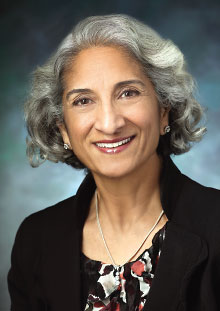Sexual Misconduct Perpetrators Often Permitted to Remain in Academia
Abstract
Forty percent of identified faculty in academic medicine who were accused of sexual misconduct between 1982 and 2019 remained in academia, a study finds.
Past APA President Nada Stotland, M.D., M.P.H., has seen the same outcome over and over again: The perpetrators of sexual misconduct in academic medicine go unpunished and are often permitted to continue their careers unencumbered.
“Unless you’ve been around the block for few decades and been involved in women’s issues and their careers, you would never believe that people get away with it,” she said.
According to a study published April 21 in JAMA, a significant portion of people—mostly men—who were accused of sexual misconduct resulting in institutional or legal action that proved or supported guilt between 1982 and 2019 remained in academia.

The most important thing for victims of sexual misconduct to remember is that it is not their fault, and they should seek support from others, says Nada Stotland, M.D., M.P.H.
Magdalena Espinoza, M.D., a faculty associate in the Department of Internal Medicine at UT Southwestern Medical Center, and colleagues conducted internet searches to identify faculty accused of sexual misconduct in academic settings. They used both Google and FindLaw, a public database of federal and state court decisions, using keywords such as sexual misconduct or sexual harassment and medicine, physician, instructor, college, and others. The authors then performed additional searches to determine the accused faculty member’s name, characteristics, targets, institutional actions, and outcomes.
They identified 125 faculty accused of sexual misconduct between 1982 and 2019 affecting at least 1,668 targets. Nearly all (97.6%) were male, and 91.5% targeted females only. About 33% of the faculty were from U.S. News & World Report top 50-ranked colleges or universities; most were full professors, chairs, directors, or deans; and 72% targeted subordinates.
About half of the accused faculty resigned or retired, 20.8% were terminated, and 8.8% were sanctioned by funding sources or boards governing clinical practice. “We identified 50 accused faculty who remained in academia, of whom 40% held positions at a different teaching institution,” the authors wrote.
The study included only faculty who had received media attention or were involved in legal proceedings. The public documents likely do not capture the full extent of misconduct that occurred during the study period due to the lack of transparency in investigations, the authors noted.
“Although disturbing, the results are not surprising, as they echo findings published by the National Academies of Sciences, Engineering, and Medicine in 2018 that reported that close to half of women medical students have been sexually harassed,” wrote Julie Ann Frelschlag, M.D., and Katherine Files, M.B.A., both of Wake Forest Baptist Health in an accompanying commentary.
What is surprising and concerning, they continued, “is that faculty perpetrators in the biomedical and health sciences were to a degree immune to consequences.”
The Decades-Long Fight Continues
“This article for the first time highlights what happens in academia, and it’s honestly no different from what happens in the entertainment industry or sports industry,” said Geetha Jayaram, M.D., M.B.A., immediate past president of the Association of Women Psychiatrists and a professor of psychiatry and behavioral sciences at the Johns Hopkins School of Medicine.

“This problem needs to be consistently and systematically addressed until we see real change in academia,” says Geetha Jayaram, M.D., M.B.A.
For many women in academic medicine, the fight to end sexual misconduct has been long and frustrating. Women physicians have been speaking out about the problems for decades, said Maureen Sayres Van Niel, M.D., who is the APA Assembly’s representative to the Caucus of Women Psychiatrists.
“And yet we’re still talking about them today,” she said.
“There’s a sense of frustration among women physicians because we’ve been fighting this battle for so long,” said Warachal Faison, M.D., president of the Association of Women Psychiatrists and senior medical director of neuroscience and pain at Pfizer. “It’s up to all of us, men and women, to have a voice in this, to stand up and speak out.”
Changing institutions is vital to address sexual misconduct in academic medicine, as is increasing the number of women in leadership positions. Though more women now enter medical school than men, only 42% of faculty members and 20% of department chairs and deans are women, Frelschlag and Files pointed out in their commentary.
Women physicians often feel powerless to change the culture in academic medicine, Jayaram said. Often sexual misconduct is not reported because women are rightfully concerned that there will be retaliation against them that will stall their careers.
Stotland offered advice for women in academic medicine: If they are the targets of sexual misconduct, they should carefully assess the situation and ensure they’re making clear-eyed decisions about whether it’s in their best interest to report the behavior. Unfortunately, as the JAMA study outlines, reporting seldom results in sanctions against the perpetrators, but it does carry the potential to jeopardize the victims’ careers.
Women should seek support from women’s groups and organizations. “Being in these situations tears down your self-esteem—it makes you think that your work must not be as worthwhile as it almost certainly is,” she said. “You need support as you make your decision about reporting.” ■



